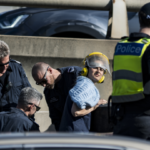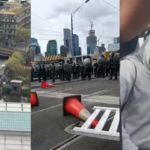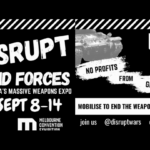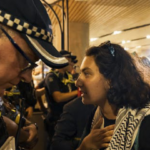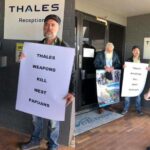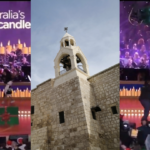VicPol Raids Antiwar Protesters En Masse: Interview with Students for Palestine’s Jasmine Duff
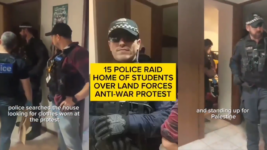
Fifteen Victoria police officers raided the house of two university students in Naarm-Melbourne on Wednesday for allegedly having taken part in the Disrupt Land Forces protests, which seems a little odd, as the raids came 60 days after the last related demonstration took place.
As the narrator of a social media clip released on the day of the raid explains, “police searched the house looking for clothes worn at the protest” and after the clothing was located, the students were then taken down to the local copshop to “intimidate them” over their political expression.
Disrupt Land Forces involved four days of demonstrations close by the Melbourne Convention and Exhibition Centre to oppose the Land Forces 2024 weapons trade show. The turnout to oppose it was formidable this year, with the Gaza genocide fuelling the rise in peaceful dissent.
The antiwar protests opposing the “one-stop-genocide-shop” were further notable, as agitators acted like test crash dummies, while Victoria police unleashed its fabled arsenal of potentially deadly nonlethal weapons, not for the first time, but in its greatest ever show of force.
Long-time coming
The 13 November raids were not the first arrests in relation to Disrupt Land Forces months after the fact.
Victoria police also arrested Students for Palestine’s Jasmine Duff on 24 October, as five officers entered her home early morning to charge her with the offence of affray.
As Duff explains in her account of the event in Overland, affray, “in layman’s terms” means “rioting”.
The university student further explains that the police entered her premises without a warrant and went into her bedroom. An armed woman officer then stayed in her room as the she got changed to ensure she did not jump out the window.
“Increasingly protesters for Palestine have been facing state repression but we need to continue coming out and standing up for those in Gaza and for those now facing Israel’s war in Lebanon,” Duff said over social media later on the day of her arrest.
Authoritarian creep
The Australian political class and mainstream media have been in overdrive since last October in an attempt to downplay the blatant massacre of an entire group of people in the Gaza Strip, which has only served to fuel the great numbers in the constituency joining the Free Palestine movement.
The pushback against the antigenocide activists of the last 13 months has also served to continue the broader campaign waged by Australian authorities against the right to protest, which is an unprotected right in most of the country. This drive had previously been targeting climate defenders.
Sydney Criminal Lawyers spoke to Students for Palestine’s Jasmine Duff about the raids against Disrupt Land Forces participants that have seen dozens arrested and the unbridled force shown to antiwar protesters by VicPol in September, which saw officers taking potshots into the crowd.
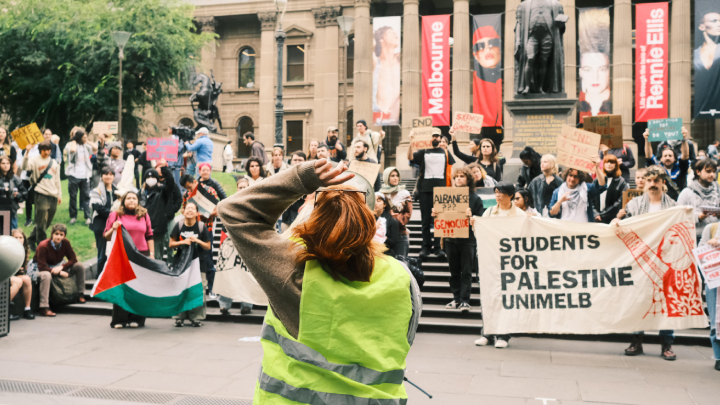
Jasmine, after we arranged to speak about Victoria police having raided you last month in relation to your participation in the Disrupt Land Forces protests, two more raids on the homes of other student activists have been carried out this week.
Victoria police have now arrested close to 40 people in relation to the September protests long after they took place. And these more recent arrests take the overall total activists arrested in relation to the protests to about 90 if those arrested at the time are included.
You point out that law enforcement has also been running articles with photographs identifying protest participants that they’re attempting to hunt down. And these arrests began prior to yours and have continued afterwards.
So, what happened this week?
It’s been really terrible. It is clear police are using mass arrests as a tactic to intimidate people out of protesting.
Police have been repeatedly turning up at the homes of young people and also some older people, who were present at the antiwar demonstrations in September.
Just this week, we’ve had three arrests that I know of. Yesterday, 15 police officers turned up at the home of two young people and they arrested both of them. They turned up with a search warrant for a hat that was worn on the day of the demonstration.
They searched the whole house. They shoved the two students into the back of the van. They also took down the details of everyone else who lives in the house. All of the police were wearing body armour.
To have 15 police arrest two young people who were at a protest is extreme behaviour and one of the things we’ve really noticed is that the type of force that police are using to arrest people is extreme in each case.
There was a young man arrested last week, and for just one person, they sent 12 police officers to arrest him.
Then they charged him with two counts of obstructing police on the day of the protests. So, there’s a disconnect between the amount of force being used on people and what the charges against them are.
Five police officers turned up to raid your home and arrest you on 24 October. These officers entered your bedroom to arrest you, however, they didn’t even have a warrant.
You’ve been charged with affray, contrary to section 195H of the Crimes Act 1958 (VIC), which carries up to 5 years prison time.
Can you give us a more detailed description of what happened on the morning? And how did it come to be that law enforcement entered your premises without a warrant?
The police started bashing on our door early in the morning. One of my housemates opened the door and asked for a warrant.
The police told her that they don’t need a warrant because, under section 459A of the Crimes Act, if they suspect someone is in a house that they want to arrest, then they’re allowed to enter it.
So, they forced their way into the house. They came into my bedroom. They handcuffed me in my bedroom. They then took me to the police station.
The whole time they were making threatening remarks to my housemates. They said things like, “If you’re not careful, we’ll search the house.”
When I was at the police station, I was seated in a bolted down chair and interrogated for some time. I just gave a ‘no comment’ interview.
It does feel intimidating when they come and do these things. And you get a visceral impression that they are purposely coming to punish people for having taken part in the Disrupt Land Forces demonstrations.
For those paying attention to Disrupt Land Forces but not actually present on the day, the scenes showed VicPol applying extreme force, which included the use of nonlethal weapons that can prove harmful and even fatal.
So, the fact that a large group of protesters that had been subjected to this extreme force are now being arrested as if they were posing some sort of threat seems a bit ridiculous.
Can you talk about what appeared to be the unbridled force that protesters were subjected to over the days that Disrupt Land Forces was operating?
It is absolutely ridiculous that antiwar protesters are now being punished for supposedly being violent, when the police used extreme violence.
But also, inside the venue itself, that’s where the real violence was happening: these deals related to, at times, nuclear weapons and also weapons produced by Israeli war manufacturers.
The force on the day was horrifying. The police came armed to the teeth with every single type of weapon that they’ve been given and has been paid for by the Labor government.
This included things like shooting into the crowd indiscriminately with rubber bullets.
There was one moment where they wanted to push the crowd back, so they threw all of these flashbang grenades that created a mist, so we couldn’t see, and they started shooting into the crowd with the rubber bullets that are shot from semiautomatic rifles.
This is a very serious form of weapon for them to be using on us.
There was one young woman who was hit in the arm by a flashbang grenade. She was hit with a rubber bullet as well, and then she was hit with a baton with so much force that for a week afterwards her arm showed the mark.
Another man was bashed to the ground with a shield and then arrested. He was charged with two counts of obstruction and then he needed an ambulance to be called because he was so badly injured by police actions, but they told him he couldn’t wait at the police station for an ambulance and instead he had to wait on the street.
So, despite the fact that he had a serious back injury, he then had to walk out across the street to wait for an ambulance. He was then hospitalised and there was potential that he was going to have to have surgery. However, those charges against him have since been dropped.
Again, they’ve tried to justify the violence used against this man via the excuse of some charges laid against him. But when they have to take these charges to the courts, they know they’re not going to stand up, so they drop them.
So, this is a clear example of how they are using violence against left-wing antiwar protesters and then charging these people in order to justify that violence.
Why was it important to disrupt the Land Forces 2024 event? Why was the turnout against it so formidable this year?
There was such a big turnout because the genocide in Gaza has really awoken a whole new generation of people to the horrors of war, militarism and imperialism.
There were thousands of us on the ground taking a stand against the war machine – against the many weapons companies that had come to Melbourne to a convention paid for by the Victorian taxpayer.
Labor was using taxpayer money to fund this convention. It was a convention for weapons makers to hobnob with politicians. There was a lavish breakfast provided to them.
If this convention had gone ahead without being protested it would have sent a terrible message.
It would have sent the message that people in Victoria, or in Melbourne, are happy for the purveyors of death and disruption to bring their wares – to advertise their wares in our city – without any opposition.
So, it was really important for people to come, gather and stand against this: both against the convention but also against war and imperialism in general.
And lastly, Jasmin, in a video after your arrest, you spoke of how the crackdown on Disrupt Land Forces participants is a part of an increasing state repression against demonstrations in aid of Gaza and Lebanon but also upon the right to protest itself.
Can you talk about how this broader campaign against these mobilisations is impacting?
There are two things at play. On the one hand, over recent years in Australia, we’ve seen real restrictions against important civil liberties, like the right to protest, and those restrictions are becoming tighter and tighter.
So, we’ve just seen new laws introduced in NSW, as we did a couple of years ago, that are directly restricting the right to demonstrate.
For a long while it was the climate movement in particular that bore the brunt of these restrictions and what we saw on the day of the Land Forces demonstration is an expression of the amount of money the Labor government has pumped into antiprotest policing over the years.
This display at Land Forces was one of the biggest demonstrations of this type of hyper-militarised police force that we’ve seen in Melbourne, but also right across Australia, and it comes hand-in-hand with that broader crack down on civil liberties and the right to protest.
The other dynamic going on right now is that the protests and the movement in solidarity with Palestine has been going on for just over a year in a serious way and the Australian government is sick of it, and they’ve been trying to clamp down on it.
The government has funded an inquiry into antisemitism, which was about politically smearing pro-Palestine activists around the time of October 7th this year.
They concocted a big fear campaign against anyone who flew a Hezbollah flag at a demonstration despite the fact that Lebanon was being bombed.
They have tried to use Islamophobia to paint people as terrorists. So, there is this ideological campaign against the Palestine movement combined with the physical repression via police use of force.
So, this is coming on a number of fronts: it is both an attack on the right to protest in general but also, on the Palestine movement in particular.
At Students for Palestine we’ve seen a real rise across the country in repression from university administrations as well.
A number of universities have just changed their rules in regard to protesting. Deaken University attempted to suspend me and another student.
But Sydney University has also suspended a couple of people over having breached a new policy that was brought in to prevent protests from happening and to crack down on free speech on campus.
So, the universities are another sphere where we’ve seen serious crackdowns on freedom of speech and the right to protest.


